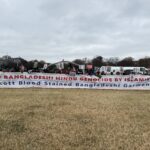In the aftermath of the April 22, 2025, terrorist massacre of Hindu tourists in Jammu and Kashmir, India, prominent Hindu organizations in the United States and the United Kingdom have launched a coordinated campaign urging global institutions to address the religious ideology fueling Islamist terrorism against Hindus, Christians, and other non-Muslim minorities worldwide.
The letter campaign, organized by HinduPACT’s Hindus Advancing Human Rights (HAHRI) initiative, has been sent to the United Nations, the European Union, the United States Commission on International Religious Freedom, the Federal Bureau of Investigation, the U.S. State Department, the Department of Homeland Security, and the U.S. Mission to the United Nations.
In an August 9 statement, HinduPACT condemned the April 22 attack in which 26 unarmed Hindu pilgrims were gunned down by Islamist terrorists in Pahalgam, Jammu and Kashmir. According to eyewitness accounts, it said the victims were forced to recite Islamic declarations of faith, present identification documents, and undergo physical checks to determine if they were circumcised, a method used to identify Hindus and other non-Muslims. The terrorists then opened fire, killing the identified victims in front of their families, it said.
Executive Director of HAHRI, Rahul Sur, stated, “This was a grave violation of international human rights laws. It was not a random act of violence-but a premeditated, religiously motivated massacre, singling out Hindus. And it is part of a global pattern that has taken countless Hindu lives across South Asia and beyond,” adding “We call upon international institutions and countries to stop enabling Islamist extremism through silence or appeasement and fulfill their obligations undertaken as signatories of human rights treaties. Hindus will no longer be invisible victims. We are demanding institutional honesty?”
The statement described the incident as part of a broader trend of religiously motivated violence against Hindus, citing ongoing “drip-drip genocide” in Pakistan, ethnic cleansing in Bangladesh, documented attacks in United Nations reports, and the near-eradication of Hindus in Afghanistan. It also recalled that in 1989-90, Hindus in Jammu and Kashmir were told to “convert, flee, or die,” forcing the mass exodus of the community, many of whom have yet to return.
HinduPACT also referenced the UN Security Council’s stance that “terrorism in all its forms and manifestations constitutes one of the most serious threats to international peace and security” and that “acts of terrorism are criminal and unjustifiable, regardless of their motivation, wherever, whenever, and by whomever committed.”
The organization emphasized that identifying the ideological roots of Islamist terrorism is not Islamophobia. According to the statement, the deliberate targeting of non-Muslims is part of a larger global challenge that demands accurate terminology, policy reform, and adherence to international law.
President of HinduPACT, Deepti Mahajan, called for an end to euphemistic language in policy discussions: “It is time to abandon politically expedient euphemisms like ‘violent extremism’ and name the threat for what it is—Islamist terrorism. If the UN and global agencies genuinely care about human rights, they must recognize Hindus as victims and Islamism as a worldwide ideological threat.”
Mahajan stressed that the April 22 massacre should serve as a turning point: “The world must stop denying the reality of Islamist terror. If the rights of Hindus are ignored today, then the rights of all non-Muslims are in danger tomorrow.”






